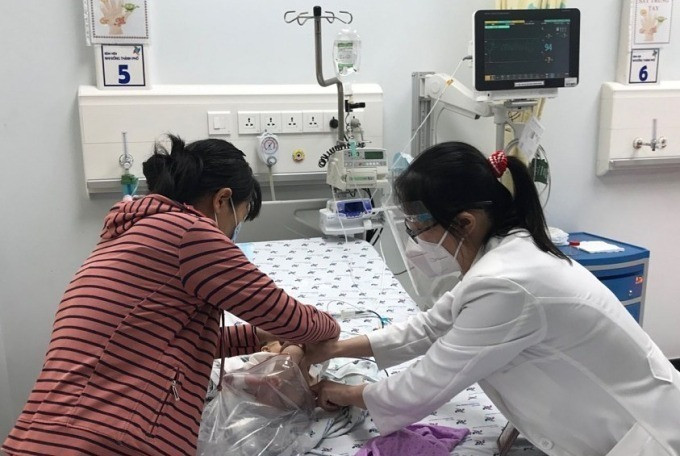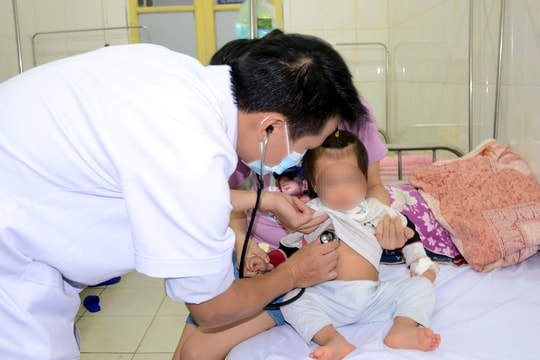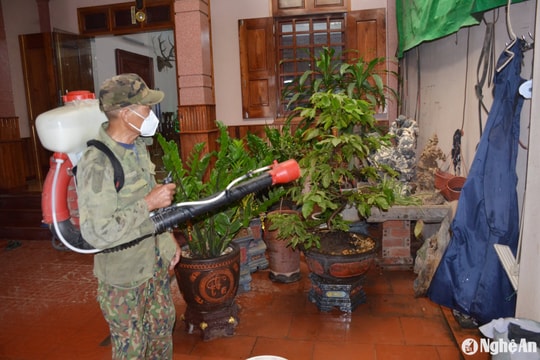Frequently asked questions about dengue fever
What are the symptoms of dengue fever, how does it progress, what day does it get worse, when do you need to go to the hospital... are common questions about this disease.
Ho Chi Minh City hospitals are recording an increasing number of dengue fever patients admitted, with severe cases on the rise.alarm. Director of Ho Chi Minh City Department of Health Tang Chi Thuong predicts that the dengue fever situation will become more complicated this year.
What is dengue fever?
This is an acute viral infection caused by the Dengue virus. The disease is transmitted from person to person through mosquitoes, can occur year-round, often increasing during the rainy season. The disease can occur in both adults and children.
What are the stages of dengue fever progression and when does it become severe?
Dr. Duong Bich Thuy, Deputy Head of the Department of Emergency, Intensive Care and Anti-Poisoning for Adults, Hospital for Tropical Diseases, Ho Chi Minh City, said the disease often progresses throughthree stages, symptoms in each stage may vary.
Fever stageUsually from day one to day three of the disease there are symptoms such as sudden, continuous high fever, headache, loss of appetite, nausea, skin congestion, muscle pain, joint pain, and pain in both eye sockets.
Dangerous phaseUsually from day 3 to day 7, the patient has severe, continuous abdominal pain, pain in the liver area, restlessness, lethargy, and lethargy. Sometimes the patient may be lethargic, have impaired perception, vomit, have difficulty breathing, bleeding gums, nosebleeds, mouth bleeding, vomiting blood, black or bloody stools, hematuria, and abnormal vaginal bleeding.
Recovery phaseUsually after 7 days, the patient's fever is gone, he feels better, has an appetite, urinates a lot, and may develop an itchy skin rash (recovery rash).
Is dengue fever dangerous?
The disease progresses in a variety of ways, from mild to severe. Most patients can recover and be healthy. However, when the disease progresses severely, if not monitored and treated promptly, it will lead to death. If the disease is diagnosed early and treated promptly, most cases progress favorably, with few deaths.
Do dengue fever patients need to be treated in hospital?
According to Dr. Thuy, most cases of dengue fever can be treated as outpatients and monitored at primary health care facilities, mainly treating symptoms. When the fever is 38.5 degrees Celsius or higher, you can take paracetamol to reduce the fever (dosage and frequency as directed by your doctor) and combine it with continuous cooling.
Dr. Nguyen Dinh Qui, Deputy Head of the Department of Infectious Diseases, Children's Hospital 2, said that the common way to identify a child with dengue fever is to have a high fever that lasts for 3 to 4 days. If the child has a fever for 3 days or more, it is best to take them to a medical facility for a blood test and a treatment plan. In cases where hospitalization is not indicated, the child is monitored and cared for at home. Children should drink plenty of water, eat easily digestible foods and use medicines to improve their health and increase their resistance.
When to go to the hospital?
Dr. Thuy recommends that dengue fever patients should go to the hospital if they have any of the following signs: increased discomfort even though the fever has decreased or gone away, inability to eat or drink, or severe vomiting. In addition, other signs that require immediate hospitalization include increased abdominal pain; cold, clammy hands and feet; fatigue, restlessness; nosebleeds, mouth bleeding, abnormal vaginal bleeding, vomiting blood, black or red stools; behavioral changes such as confusion, agitation, restlessness, or lethargy; and failure to urinate for more than 6 hours.
Dr. Qui advises parents not to be complacent when they see their child's fever decrease on the 4th or 5th day of the illness. The child may only be lethargic, tired, vomiting, have abdominal pain, or bleeding gums, but these are warning signs of worsening. Children should be taken to the hospital when they have signs of vomiting, mucosal bleeding, nosebleeds, or bleeding gums, even at night, and should not wait until morning. If left untreated, they may go into deep shock, not recover, and even lead to death.
Doctor Do Chau Viet, Head of the Department of Infectious Diseases - Covid, Children's Hospital 2, said that 90% of dengue fever cases are usually simple, recovering in about a week; the remaining 10% are severe cases. Severe cases are mainly children who are overweight, obese or have underlying diseases such as cardiovascular, brain, lung, kidney, and even post-Covid-19 cases. Parents need to promptly take their children to the hospital and follow the doctor's instructions, avoid leaving it too late, which will cause serious progression and damage to organs.
 |
| A newborn baby had to be hospitalized for liver damage after dengue fever. Photo: City Children's Hospital |
Mistakes to avoid when treating dengue fever
According to Dr. Nguyen Minh Tien, Deputy Director of City Children's Hospital, many parents are often confused and haveimproper handlingWhen a child has dengue fever. A common mistake is to be impatient when the child has a persistent fever, arbitrarily giving antipyretics more than 4-5 times a day, leading to drug abuse, which can cause severe liver damage and gastrointestinal bleeding. Note, reduce fever with paracetamol, do not arbitrarily give children aspirin or ibuprofen because it can cause stomach bleeding.
Many parents, when seeing bruises on their children, cut and drain the toxic blood. Scraping and cutting can easily lead to uncontrollable bleeding. This is an entry point for bacteria, which can cause blood clotting disorders.
Many people see that their children have fever accompanied by digestive disorders and continuous vomiting, so they let their children fast, not drink, causing them to not get enough nutrients, making them lose strength easily, in some cases, it can cause hypoglycemia, causing convulsions. The best solution is to give children liquid, easy-to-digest foods, divided into many small meals a day. It is necessary to provide plenty of water to avoid dehydration and electrolyte deficiency. Avoid red and black foods and drinks because they are difficult to distinguish from blood when children vomit or have diarrhea.
A common mistake is that parents are subjective when their child's fever has gone down and do not continue to monitor. Dengue fever is caused by a virus, so the fever will come and go and progress abnormally. If the child's fever has gone down but there are still abnormal symptoms such as cold hands and feet, stomachache, and vomiting, it is necessary to monitor the child and take him to the emergency room promptly.
Do not give children with dengue fever IV fluids at private clinics or unqualified medical facilities. There have been many cases where improper IV fluids have made the disease worse and prolonged, easily causing edema, severe heart failure... by the time they are transferred to the hospital, it is too late to save their lives.
Dengue fever in children is easily confused with other diseases.
Dr. Nguyen Dong Bao Chau, Children's Hospital 1, said that the initial symptoms of dengue fever are quite similar to those of other viral infections such as the flu. In particular, the onset of dengue fever is sometimes similar to the symptoms of Covid-19, so it is easy to miss. In the current context, many parents are afraid to take their children to the hospital, leading to the risk of dengue fever in children becoming more severe, causing many complications, even endangering their lives.
What foods should dengue fever patients avoid?
According to Dr. Tien, dengue fever patients often lose water due to high fever, blood is concentrated so the amount of water needed is more than when not sick. You can drink filtered water, boiled water, orange juice, lemon juice, coconut water, soup, porridge, oresol because these types of water, in addition to rehydrating, also replenish some electrolytes lost due to high fever, and have a significant amount of vitamin C to help strengthen blood vessels and increase resistance.
Children with dengue fever have a high fever continuously, so they need to be provided with more energy than usual. Due to the disease, children become tired and lose their appetite, so you should choose foods that they like. If the child eats little, you should feed them many times, without abstaining. Feeding them liquid, nutritious, easy-to-digest foods such as porridge, soup, milk... combined with a reasonable rest regimen will help them recover quickly.
Limit foods that are brown or red in color such as sarsaparilla, chocolate, blood porridge... because they can easily be confused with gastrointestinal bleeding.
Prevention of dengue fever
There is currently no vaccine to prevent dengue fever. To prevent the disease, it is necessary to actively kill mosquitoes and larvae.
The Ho Chi Minh City Center for Disease Control recommends that every citizen, family, and agency should kill larvae and mosquitoes to prevent dengue fever. Spend 10-15 minutes each week cleaning up your workplace and living space, inside and around the house, tidying up, and not allowing any water to accumulate and breed larvae. Turn over unused buckets, jars, and bottles; scrub and change the water in flower vases and water bowls at least once a week; clean the porch, roof, and gutters...
Cover jars, ponds, and water tanks when not in use to prevent mosquitoes from laying eggs and breeding larvae. In places where water is not used for drinking or daily activities, fish can be released to kill larvae. Use sprays, incense, and mosquito repellent creams, wear long-sleeved clothes, and sleep under mosquito nets even during the day to avoid mosquito bites.





